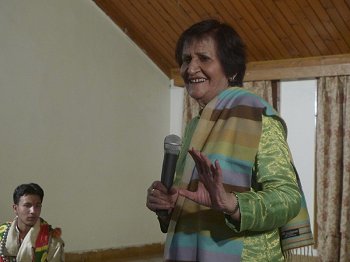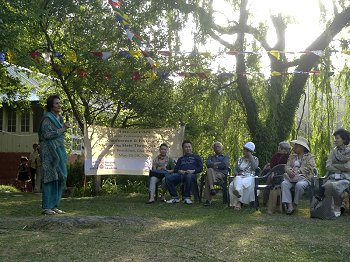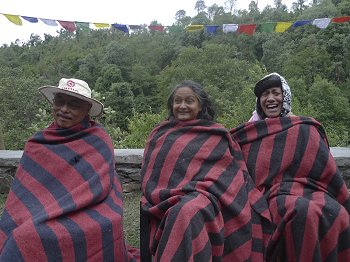
|  |

|  |
The 12th APPAN festival in the Himalayas (Re)Discovering the line where culture meets life - Shanta Serbjeet Singh, New Delhi e-mail: shanta.serbjeetsingh@gmail.com Photos: Annie Grieg June 15, 2010 Talking about life and culture, it would be apt to start this column with an apology, a sign of plain good manners, the kind that must lie at the root of anyone who claims to be cultured! I let down both my loyal readers - and hopefully there are some! - and the amazing duo that runs this site, Anita Ratnam and Lalitha Venkat, by my 'no show' in May! I stretched myself so much in organising the Appan Symposium and Festival at Dalhousie, a beautiful resort town at 7,000 feet above sea level on the Dhauladhar Range, that deadlines just sped by while I watched helplessly! So, to make amends, let me start by recapitulating what the 12th APPAN was all about. A conclave of about 45 wonderful persons from the world of culture, writers, artistes, theoreticians and managers, from many countries of Asia and Europe, all 'captive prisoners' in a beautiful environment, discussing key issues like 'why culture' and can the arts and dialogue route actually 'manage hate,' our theme? The location was my family estate at Banikhet where we gathered everyday at 9:30am and returned at 7:30pm for food and spirits! The delegates stayed at the Himachal Government's fine, new hotel called, aptly enough, Mani Mahesh, named after the famous peak nearby, celebrated in Puranic lore as the abode of Shiva. Mani Mahesh is a popular pilgrim trek that goes through the inner Chamba valley and the ancient kingdom of the Chamba kings at Brahmour, the incredibly beautiful temple town at 8, 5000 ft above sea level, with two of the only surviving carved wooden temples in the world.   From Ratan Thiyam, the Vice Chairman of the Sangeet Natak Akademi, who delivered a moving keynote address to Ambassador Lalit Mansingh, former Foreign Secretary, from the incredible singer, Davazorig, from Mongolia, who manages the rarest of overtones in one breath to our own Uma Sharma, it was a group which magically fell into place as if everyone had known each other for ever and had so much to share! The Conference's theme "Managing Hate: Through Art, Culture and Dialogue" is a double-edged sword. For, is it not in the name of culture that the Bamiyan Buddhas were brought down and the library at Alexandria burnt? All the violence and hatred in the world is through and in the name of different ways of looking at the word "culture." No matter the animosity and anger we have against Pakistan's India-baiting policies, you have only to set a Pakistani ghazal singer on a North Indian stage and see how soon the "Wah,Wahs" fill the hall and the audience is visibly eating out of the performer's hand! But our job was to go beyond clichés and show the world - and each other - how culture has a strong economic content and the way forward is to use it in our national policies. Simon Evans, from England, whose pioneering organization 'Creative Clusters' has helped put Britain on the top of the world's policy heap regarding the deep connection between economics and culture, gave a thought provoking presentation, entitled "A Hamlet Moment for the Arts." Simon's 'Creative Clusters' and the writings of John Howkins, another important English culture theoretician, have given several leads on creating economic value of the creative sector. Evans gave examples from Abu Dhabi and Indonesia, both Muslim countries. The creative sector in Indonesia, a country whose travel on the culture route is fairly recent, now accounts for more than 5.4 million jobs and 6% of the Indonesian economy. This is the country's fifth largest source of exports. The government has set a target that would nearly double the contribution to GDP by 2025. Think of the millions of stimulating new jobs that would mean for the Indonesian people.  Evans exhorted his Arab audience to use the wind of creativity without which the museums, universities, and other fabulous buildings planned will be empty shells. But ride this wind, he told his audience, and you will raise from these desert sands, something extraordinary: a capital of creativity that is modern … that is global … and that is fully Arab. It is easy to be cynical about all this. The wealthy and powerful have always put their surplus money into ostentatious displays of culture, from Cleopatra to Carnegie. Is there any more to Saadiyat than that? Here is part of an official press release: "The long-term plans also include the development of a creative campus of graduate schools… devoted to art, architecture, music and drama. Special attention will be given to educational outreach programmes for the youth of the entire Gulf region." And it ended: "Abu Dhabi has an estimated 9.2 per cent of the world's proven oil reserves and four per cent of its total proven natural gas reserves. The emirate has a per capita income of $46,185 - the highest in the world. Realizing the challenges posed by the country's heavy economic reliance on finite carbon resources, the emirate's leadership is actively pursuing economic diversification. Abu Dhabi is not only showing off its success with these cultural projects, it is also addressing its biggest national weakness – that one day the oil will run out. The government is building these cultural facilities as a hard-headed, financially-driven investment in the country's future." That, I think, is worth thinking about..  Shanta Serbjeet Singh, for twenty-five years, columnist, critic and media analyst for The Hindustan Times, The Economic Times and The Times of India, is the recipient of the Lifetime Achievement Award of the Sangeet Natak Akademi and Delhi Govt.'s Sahitya Kala Parishad for her contribution to the field of culture. She just finished her term as Vice Chairman of the SNA, is the founder-secretary of the World Culture Forum and continues as Chair of the UNESCO created NGO APPAN (The Asia-Pacific Performing Arts Network), a position to which she was appointed in 2001. Singh has authored several well-known publications such as 'Indian Dance: The Ultimate Metaphor' (published by Ravi Kumar (Paris), 'The 50th Milestone: A Feminine Critique' (Sterling Publishers, to mark India's fiftieth anniversary of Independence), 'Nanak, The Guru' (Oxford University Press) and 'America and You' (22 editions). |